Android Build System
On November 23 & 24, I attended the first ever Android Dev Summit. The following are notes that I took during talks. I have included the video of the talk as well. Again, these are my notes from the talk, not my original content.
Chiu-Ki Chan (Android GDE) took really great notes during the session as well, here’s what she had:
The Android Build System by @droidxav @benol @dochez #AndroidDevSummit #Sketchnotes pic.twitter.com/ppZAfh5J3l
— Chiu-Ki Chan (@chiuki) November 24, 2015Tips
- Use the daemon
--daemonororg.gradle.debug = true
- Give it enough memeory
- Control the number of threads
- Use the latest build tools
- Get an SSD
- Don’t use timestamps or commit numbers in debug build files
Try:
android {
dexOptions {
dexInProcess = true
}
}
Consider having a development flavor using min SDK 21, as it’s going to be faster.
android.productFlavors {
normal
dev {
minSdkVersion 21
}
}
Testing
Test dependencies
dependencies {
compile ".."
testCompile "junit:junit:4.12"
testCompile "org.mockito:mockito-core:1.9.5"
}
Unit testing
config:
unitTests.all {
jvmArgs "-XX:MaxPermSize=256m"
beforeTest { descriptor ->
logger.lifecycle("Running test: " + descriptor)
}
}
Using a test project
Use a separate project just for the test APK.
In main project:
apply plugin: 'com.android.application'
android {
...
publishNonDefault true
}
In test project:
apply plugin: 'com.android.test'
android {
targetProjectPath ':app'
targetVariant 'debug'
defaultConfig {
minSdkVersion 8
testInstrumentationRunner 'android.support.test.runner.AndroidJUnitRunner'
}
}
Test code then lives in the main source set of your test project.
Instrumentation tag still needs to be added to the test project manifest, however they’re hoping to be able to remove this step soon:
<manifest ...>
<instrumentation
android:name="android.support.test.runner.AndroidJUnitRunner"
android:targetPackage="com.example.app" />
</manifest>
Running task on test project:
./gradlew :testProject:connectedAndroidTest
One note on all of this is to make sure that you avoid build tools and dependency version conflicts! Main APK and Test APK need to have the same Build Tools version, and same versions for dependencies. This should be common sense (since you want to test the same versions of everything).
Native Support
New plugins
New plugins for native (content at link may change):
- com.android.model.application - *.apk
- com.android.model.library - *.aar
- com.android.model.native - *.so
In build.gradle:
apply plugin: 'com.android.model.application'
model {
android {
compileSdkVersion = 22
buildToolsVersion = "22.0.1"
ndk.with {
moduleName = "native"
// and other configurations like the following
CFlags.add("-DCUSTOM_DEFINE")
cppFlags.add("-DCUSTOM_DEFINE")
ldFlags.add("-L/custom/lib/path")
ldLibs.add("log")
stl = "stlport_static"
}
}
}
Inter-module dependencies
Inter-module dependencies for native code, using a library project for the native code:
apply plugin: 'com.android.model.application'
model {
android.sources {
main {
jni {
dependencies {
project ":lib"
}
}
}
}
}
Perhaps the lib project with native code is set up like this:
apply plugin: "com.android.model.native"
model {
android {
compileSdkVersion = 21
}
android.ndk {
moduleName = "hello"
}
}
Extending the Android plugin
afterEvaluate
Old way:
project.afterEvaluate {
def task = project.tasks.getByName('transformClassesWithInstantRunForDebug')
// ...
}
- not part of the official API
- no guarantee that task names will be stable
- no guarantee that things won’t be merged or split
Here’s what the flow looks like if you want to write Gradle Android plugins:
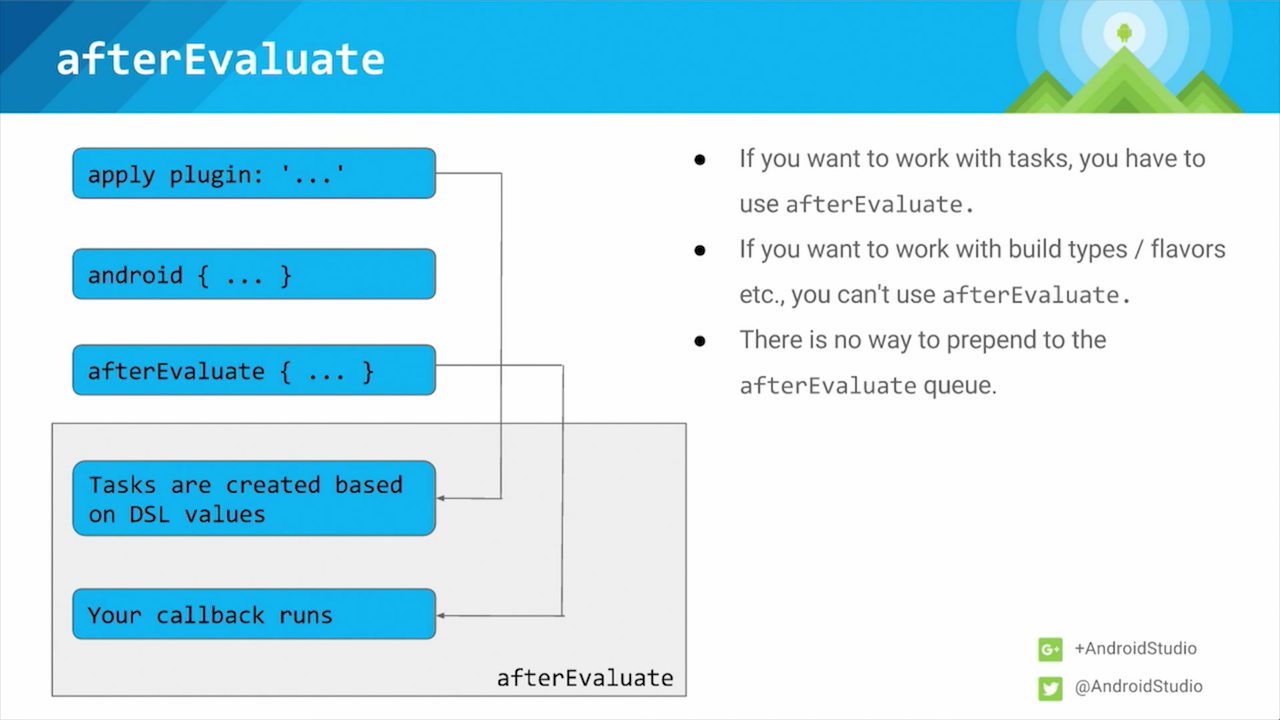
- If you want to work with tasks, you have to use
afterEvaluate - If you want to work with build types/flavors, etc., you can’t use
afterEvaluate - There is no way to prepend to the
afterEvaluatequeue
Variant API
The correct way to extend the Gradle Android plugin.
android {
applicationVariants.all {
variant -> ...
}
}
Or:
android {
libraryVariants.all {
variant -> ...
}
}
Note the .all, that’s important!
getName()- Unique Name for variants
getDirName()- Unique folder segment(s)
getApplicationId()- Computed application id
Read-only:
getBuildType()getProductFlavors()getMergedFlavor()getTaskName()registerJavaGeneratingTask()registerResGeneratingTask()
Public and private task APIs may be broken. They’re trying to get better about it.
Transform API
Problem: inject tasks between javac and dx.
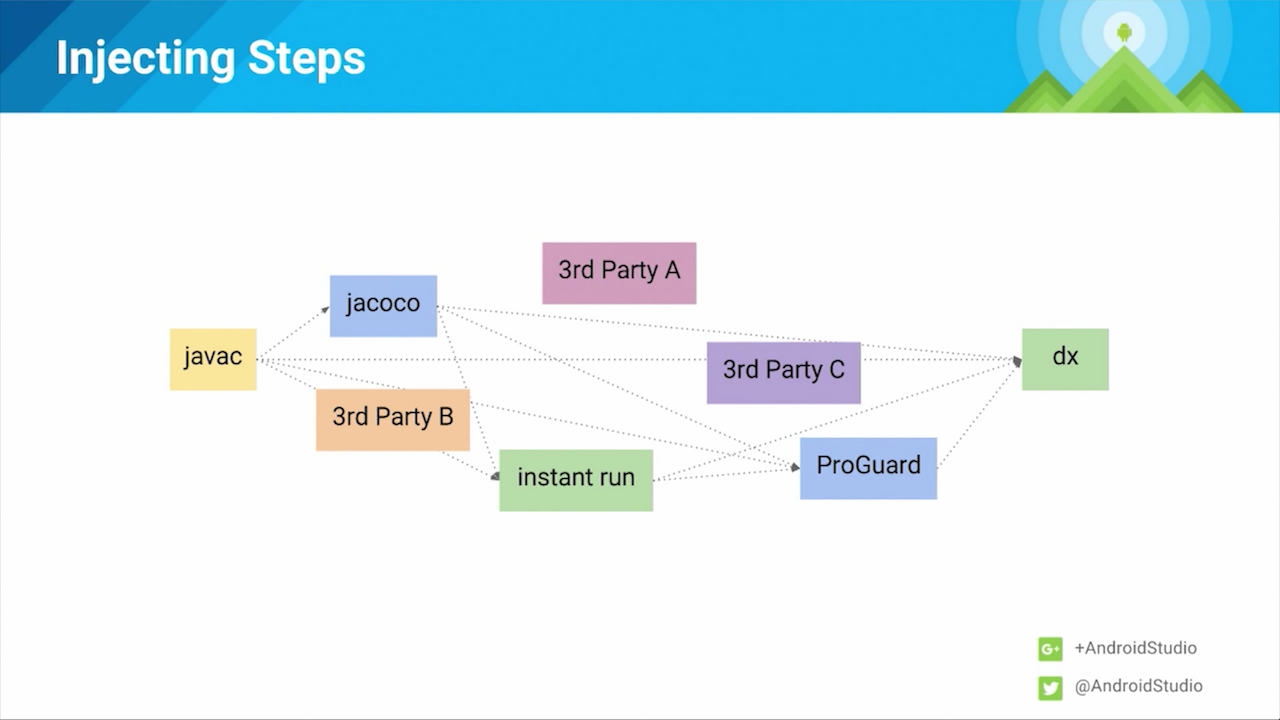
It’s a mess!
Solution: Transform API
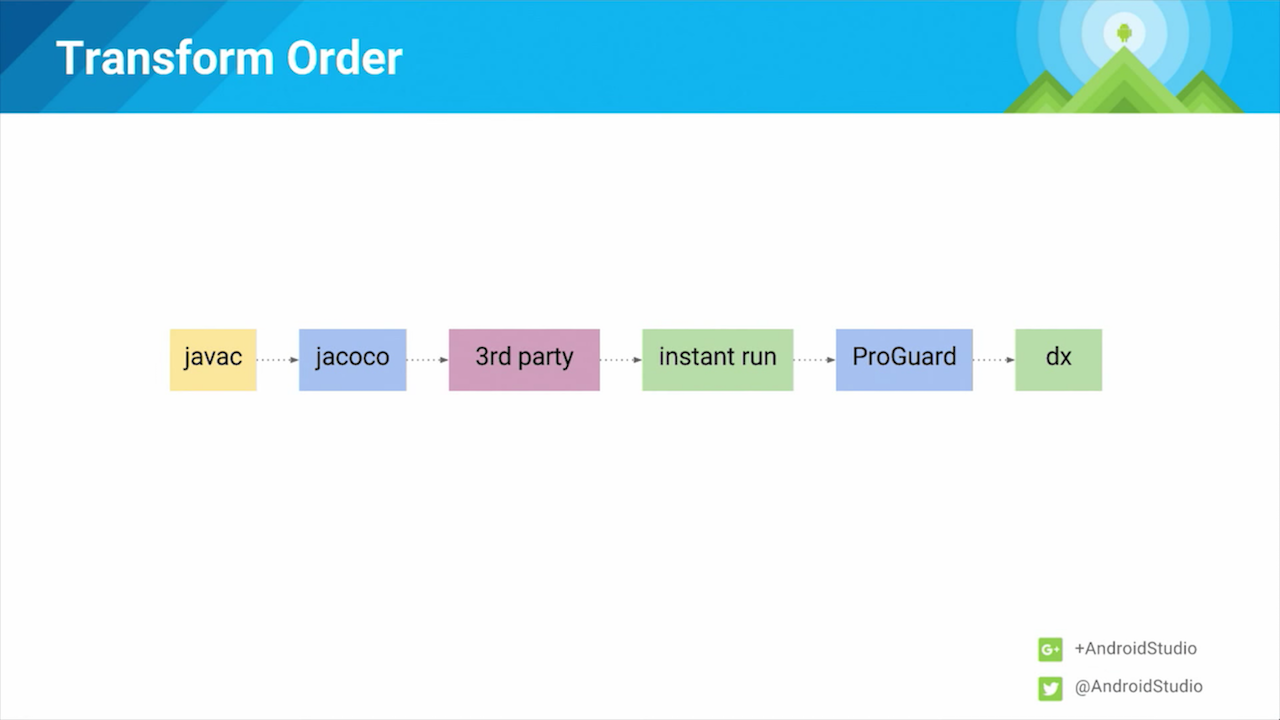
Much cleaner!
- Pipeline of transforms
- API abstracts Gradle tasks, focus on the transform part
- Handles dependencies between transforms
- Just register a new transform
- Support different types of content: class, resources and dex files
- Support different scopes: Project, sub-projects, etc.
com.android.build.api.transform.Transform methods:
getName()getInputTypes()getScopes()isIncremental()transform(...)
Using it:
dependencies {
compile "com.android.tools.build:transform-api:2.0.0"
}
The Transform API uses a fixed order, to reduce bugs.
Built-in transforms:
- Jacoco
- Proguard/ New shrinker
- InstantRun
- Dex
Limitations:
- Global transforms only
- No per-variant transform
- No order control through API
Javadoc for Android Gradle DSL
Inspecting your builds
The following Gradle tasks will help you to inspect your builds:
$./gradlew :app:dependencies [--configuration <name>]$./gradlew :app:sourceSets$./gradlew :app:signingReport
Instant Run
Only compiles, dex’s, and delivers .class that has changed.
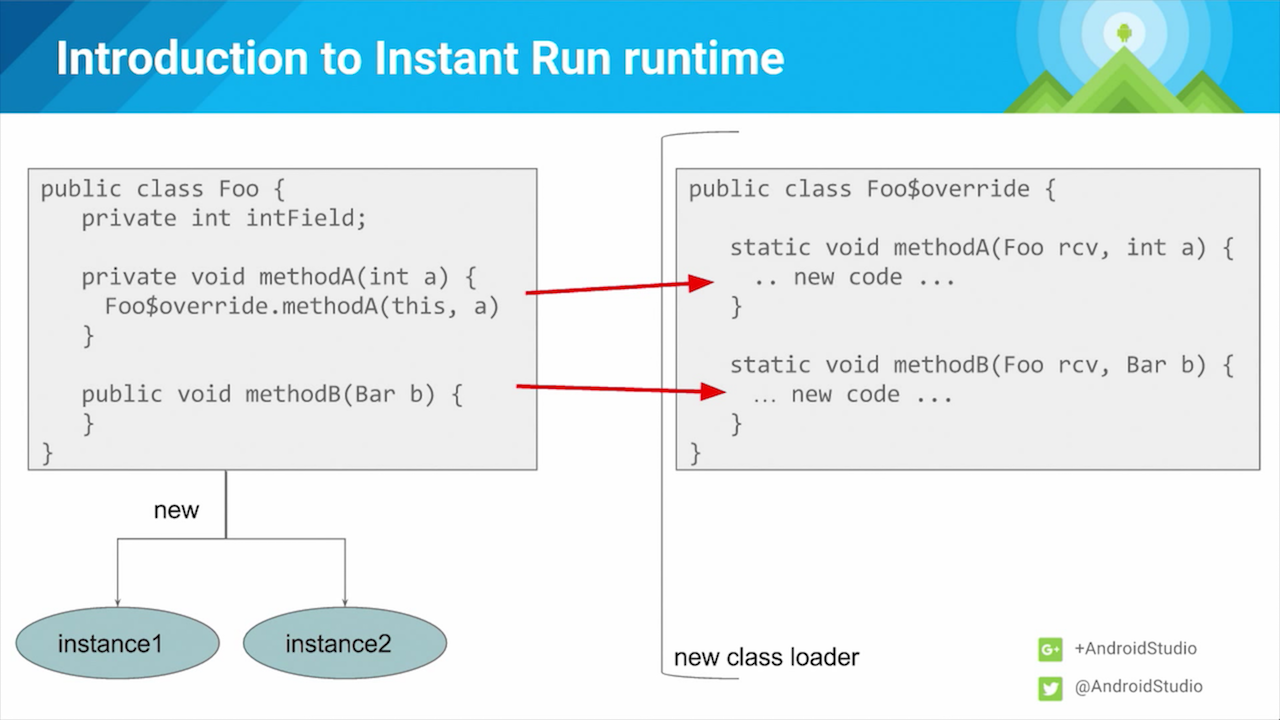
$overrideclasses will appear in stack traces, and in the debugger- New method calls use new code
- recursive calls can be a mix of old and new method code
- Classes are loaded once, not reloaded
- Class initializer changes are incompatible changes
- Static variables are not reloaded
- Methods are replaced
- Existing instances are untouched
- instances fields of existing instances are not reinitialized
- also true for singletons
- Restart app if you get weird behavior
API specific Multi-APKs
Deprecated way:
android {
...
productFlavors {
x86 {
ndk {
abiFilter "x86"
}
}
...
full {...}
}
}
New way of doing it:
android {
splits {
abi {
enabled true
reset()
include 'x86', 'armeabi-v7a', 'mips'
universalApk true
}
}
}
Resource Shrinker
android {
buildTypes {
release {
minifyEnabled true
shrinkResources true
proguardFiles getDefaultProguardFile('proguard-android.txt')
}
}
}
Sharing constants between sub-projects
You can use Gradle extensions to create shared properties.
In /build.gradle:
buildscript {
...
}
ext {
toolsVersion = "23.0.2"
deps = [
guava: "com.google.guava:guava:18.0",
...
]
}
In /app/build.gradle:
android {
buildToolsVersion rootProject.toolsVersion
...
}
dependencies {
compile rootProject.deps.guava
}
Scoping
The dependencies block is a top-level attribute in the current version. Even if you add dependencies only within specific flavors of your app, they will be added to all flavors. Instead, if you prepend the product flavor to the compile command in the dependencies block, you can restrict it that way.
android {
productFlavors {
free {...}
paid {...}
}
}
dependencies {
freeCompile '...'
}
Flavor Dimensions
old:
android {
productFlavors {
freeBlue
freeRed
premiumBlue
premiumRed
}
}
New:
android {
flavorDimensions "price", "color"
productFlavors {
free { dimension "price" }
premium { dimension "price" }
blue { dimension "color" }
red { dimension "color" }
}
}
Variant filters
android {
variantFilter { VariantFilter variant ->
if (variant.flavors[0].name == "dev"
&& variant.buildType.name == "release") {
// no point in having a devRelease variant
variant.ignore = true
}
}
}
Vector Drawables
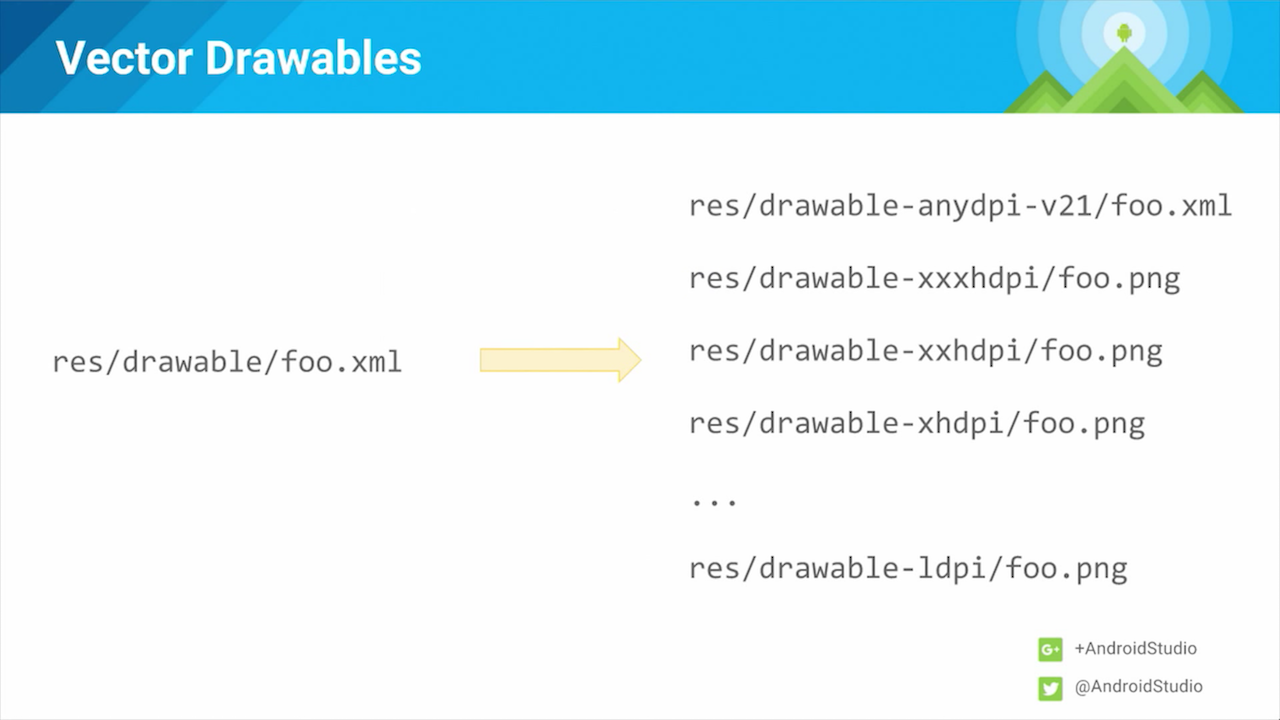
Vector in res/drawable/vector.xml (or xml), it will automatically generate all flavors. Generated flavors and densities can be configured in the build.gradle file. Officially supported in API 21, density specific pngs generated for older devices. Per flavor setting.